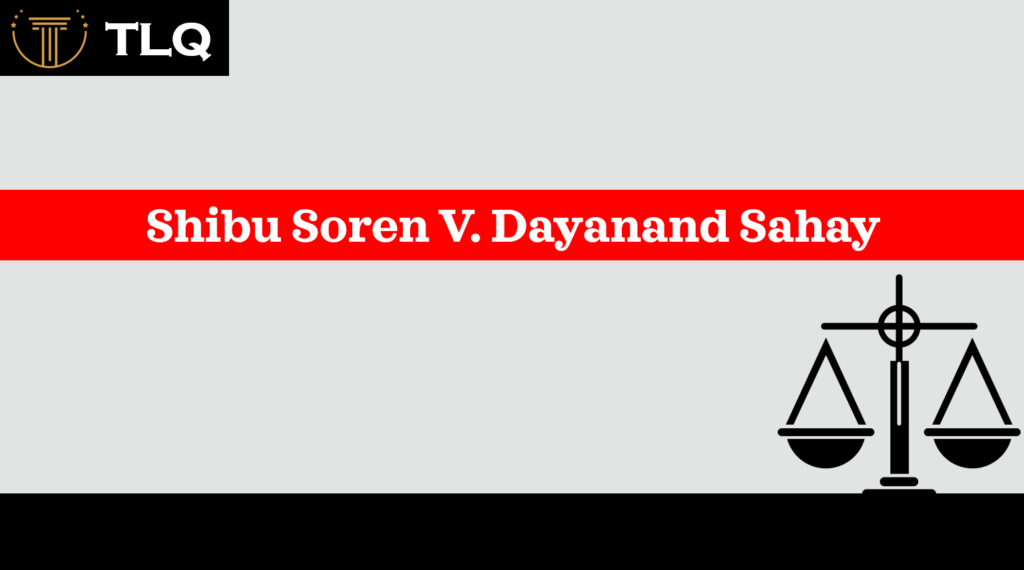Published On: 12th October, 2023
Aparna Bhat v. State Of Madhya Pradesh
DATE OF JUDGMENT: 18th March, 2021
BENCH: A.M. Khanwilkar, S. Ravindra Bhat
FACTS OF THE CASE:
- The case states that on 20.04.2020 at about 2:30 am, the accused-applicant entered the house of the complainant, who is her neighbor, and allegedly attempted to sexually harass her. The crime was registered in Bhatpachlana Police Station, district- Ujjain for offenses punishable under sections 452, 354A, 323, and 506 of the Indian Penal Code (IPC). The case was investigated and a charge sheet was filed.
- Under section 438 of the code of criminal procedure, the accused filed an application seeking anticipatory bail.
- The high court of Madhya Pradesh granted the bail, under some conditions. The following conditions were challenged.
- The conditions imposed were that the accused along with his wife was supposed to visit the complainant with rakhi thread/band on 3rd August 2020 at about 11:00 am and request the complainant Sarda Bai to tie rakhi thread in his hand with the promise to protect her in all situations possible with best of his abilities. The accused was also asked to give an amount of 11,000 to the complainant as a token of gift that brothers are supposed to give to their sisters, according to rakhi rituals.
- The applicant was also supposed to give an amount of 5,000 to the complainant’s son- Vishal for the purchase of sweets and clothes.
- The photographs of the event and receipts of payments made need to be filed through the counsel to keep them in the record of this case before this registry. It was also mentioned that the deposited amount shall not influence the pending trial, but is only for the enlargement of the applicant on bail.
- The plea was filed by Aparna Bhat and eight other attorneys against the order passed by the High Court of Madhya Pradesh to seek anticipatory bail.
ISSUES:
- Whether the court should impose such conditions and guidelines while providing bail or anticipatory bail, and what impact such judgment will create in society?
- Should the accused be permitted to meet the victim and any of her family members?
- Do such orders amount to the conduct of the trial in an unfair manner?
ARGUMENTS:
PETITIONER-
- Petitioner argued against the conditions impugned by the Madhya Pradesh High Court on the accused for seeking bail.
- Petitioner argued on the expressions “in the interest of justice”, “such other conditions the court considers necessary” and “as it may think fit” as mentioned under sections 437(3) (c) and 438(2)(iv) of CrPC, it implies that court can add conditions to provide bail but these conditions are required to be stated in law, it should not be influenced by any other external factors and be able to serve the main purpose of granting bail.
- The petitioner cited Kunal Kumar Tiwri v. State of Bihar and Sumit Mehta v. State of (NCT of Delhi) cases and argued that the court must observe the decisions while considering and dealing with bail applications. The petitioner also cited State of MP v. Madanlal and asked to make observations in para 18 of the case which stated that in cases of sexual offenses, the idea of compromise, especially in the form of marriage between the accused and the prosecutrix is abhorrent, and should not be considered a judicial remedy, as it would be antithetical to the woman’s honor and dignity. Relevance was also made in Ramphal v. State of Haryana where the court took note that compromise between survivor and accused is of no use in cases such as rape and sexual assault.
- The petitioner urged the court that no observation/condition should be made that encourages compromise and downgrades such a heinous crime by indicating that such offenses are remediable by way of a compromise/ by marriage and the cases Bishambhar Dayal Chandra Mohan … vs State Of Uttar Pradesh & Ors, Esakkimuthu @ Samuvel vs The Inspector Of Police, Sk. Safikul Islam And Anr vs The State Of West Bengal And Ors, Gyanaranjan Mallik vs the State Of Odisha was cited.
- The petitioner also requested that no such order or guidelines should be passed by the court that could harmfully affect the dignity of women and obstruct the fair and unbiased case trial and cited various cases where conditions of compromise between the two parties in such heinous crimes were rejected.
THE COUNSEL FOR INTERVENORS-
The intervenor argued that sections 437(2) and 438 grant the court’s power to impose conditions by mentioning the phrase “any condition” while granting bail. Hence recently, the court has started to impose irrelevant conditions for the same. The intervenors also mentioned twenty-three instances imposing such conditions and cited cases where courts have put forward certain conditions for granting bail.
JUDGEMENT:
The honorable Supreme Court and honorable judges overruled the order passed by the High Court of Madhya Pradesh and asked the courts to not avail of such a liberal approach that might further undermine the dignity of the accused women. The Supreme Court passed different guidelines and directions for such cases-
- Conditions for seeking bail should not include or permit contact between the accused and the victim. The condition must seek to protect the complainant from any harassment by the accused.
- Wherever bail is granted, the complainant may immediately be informed that the accused has been granted bail.
- Bail conditions and orders must strictly follow the requirements of CrPC and must be free from stereotypical or patriarchal notions about women and their place in society.
- The courts while adjudicating cases should not include or entertain notions that indulge compromise between the prosecutrix and the accused to get married, as it is beyond their powers and jurisdiction. The attorney general even argued for gender equality and stated the guidelines by highlighting the importance of gender sanitization at all levels of the judiciary. Accordingly, he submitted the aspect to train judges to be more gender-sensitive and avoid the use of gender-based stereotypes while deciding cases about sexual offenses. Secondly, judges should show sensitivity toward sexual offense survivors and should take into account the survivor’s perspectives and experiences when making legal decisions.
- The court further pointed out the following stereotypes that are often encountered in the course of judicial decision-making and should be avoided: –
- Women are physically weak;
- Women cannot make decisions on their own;
- Men are the head of the household and must make all the decisions related to family;
- Women should be submissive and obedient;
- Good women are sexually chaste;
- Every woman wants to be a mother;
- Women should be the ones in charge of their children;
- Being alone at night or wearing certain clothes makes women responsible for being attacked;
- Women are emotional and often overreact or dramatize hence it is necessary to corroborate their testimony;
- Testimonial evidence provided by sexually active women may be suspected when assessing “consent” in sexual offense cases;
- Lack of evidence of physical harm in sexual offense cases means consent was given.
CONCLUSION
India is a place where people with different cultural backgrounds and traditions live together and constitute a society. This society has been prevalent in patriarchy and male domination since ancient times. This domination has affected the society at large where every action of women was questioned. Women frequently objected to their conduct, wearing certain types of clothes, showing a confident attitude, getting educated, growing economically, etc. Even in the judiciary system insensitiveness of judges towards rape or sexual assault victims and survivors was seen while interrogating them. Women who already face discrimination in society at almost every level will get the same treatment inside the court as well then it is the humongous failure of the judicial system.
Judges are protectors and justice givers, therefore it is the sole responsibility of judges to be cautious while delivering judgment or making any type of comment in the court of justice. The honorable Supreme Court of India to avoid such instances, passed the judgment in favor of women that will provide some ease to them. The order passed was a step towards granting gender-biased-free judgments and avoiding judicial stereotyping. The main goal of the ruling was to stop the courts from overstepping their bounds and rendering rulings that would result in injustice and foster an atmosphere of arbitrary behavior in society. The Supreme Court has set an important precedent for courts and has mentioned the guidelines on how to manage such cases with empathy and sensitivity.




